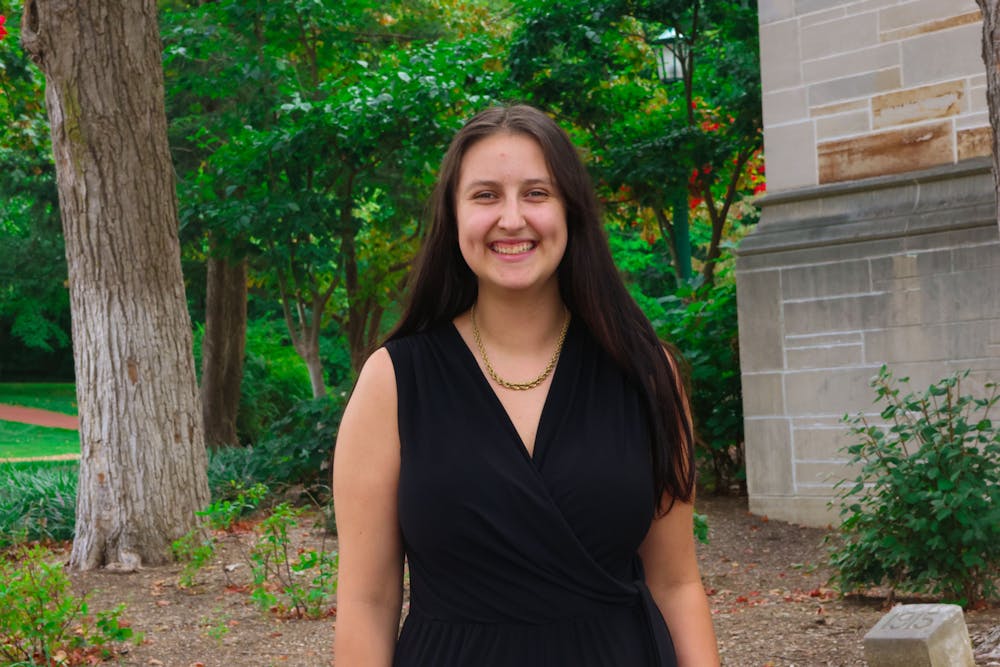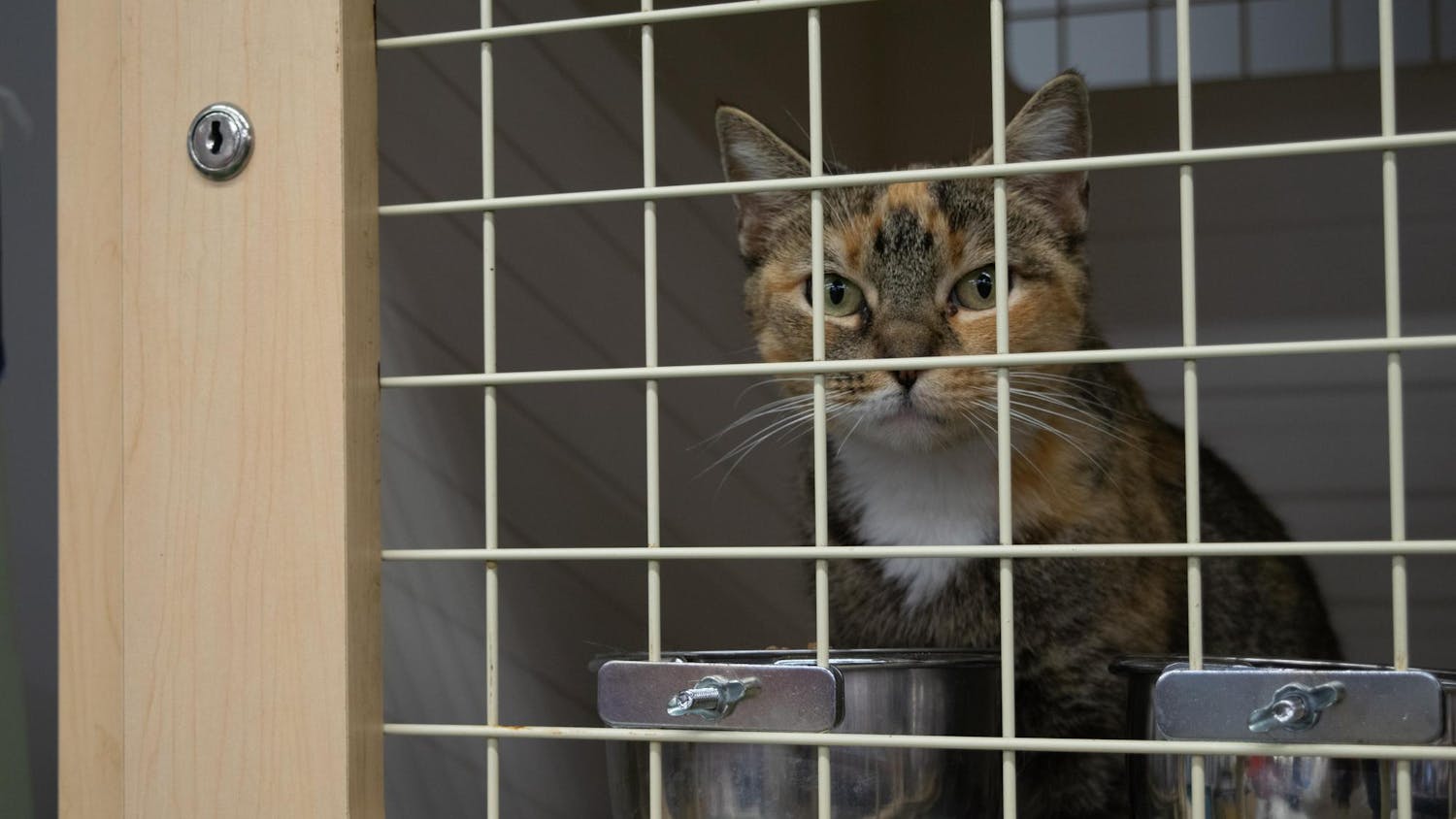Sydney Zulich, a 20-year-old IU alumna and budding politician, is on the verge of making history.
With no opposition, Zulich is slated to become the youngest person to ever serve on the Bloomington City Council. At this point, campaigning is not a requirement, but Zulich is working toward something greater than this election cycle.
Zulich, dressed in her campaign's signature pink T-shirts, slips through the cramped hallways of Teter Quadrangle’s first floor at noon Sept. 10. The overhead lights cast a yellow sheen on the dorm, and the air conditioning struggles to keep pace with the lingering summer heat.
She reaches the first door, adjusts her clipboard and knocks. She waits a few beats, then tucks a piece of campaign literature in the door.
A good portion of the canvassing goes like this, and Zulich begins to operate with a slow and steady rhythm. One door in Teter has a sign that reads “I do not wish to be contacted by poll takers,” which includes canvassers like Zulich, so she moves on to the next. Another unopened door has a white board asking what people are listening to; in one of the few remaining white spaces, Zulich scribbles “Coming of Age” by Maisie Peters.
Bloomington — a city where more than half of the population is IU students — has never had a full-time undergraduate student serve on the city council. Zulich, who graduated last spring with a degree in International Law and Russian, will not be the first.
Now past the point where opposition candidates can file, Zulich is set to represent the newly drawn District 6, a majority student district formed with the help of an independent redistricting committee and the urging of District 6’s current representative, Stephen Volan, who will be leaving his two decades of council service behind once Zulich takes over.
With her 21st birthday just before Election Day, Zulich follows in the footsteps of Republican Jason Banach, who became the youngest city councilmember ever to serve in Indiana when he was elected to the Bloomington City Council in 1995 at the age of 22.
But while Zulich’s youth will provide a fresh perspective on the council, the fight for student representation is far from over.
When students at Teter start opening their doors, it quickly becomes clear most of them know nothing about local politics. They are often not registered to vote, and they don’t have strong opinions about whether or not they should. Above all, they definitely do not know Zulich, their future representative — at least, they didn’t before she knocked on their door.
A girl with freshly showered hair opens the door, and Zulich launches into her pitch.
She introduces herself as the student’s future representative. She asks them if they’re registered to vote – if not, would they like to be? If they are from Indiana, all they need is a driver's license. Without that or a Bureau of Motor Vehicles issued ID, they need to know the last four digits of their social security number. A lot don’t.
Out-of-staters need a physical form to switch their registration to Indiana, which Zulich offers to pick up from their dorm once they fill it out.
Usually, Zulich asks the students if there is anything they’d like to see changed about Bloomington. The most common response is “I don’t know; I’ve only been here three weeks.”
[Related: Bloomington City Council votes down ban on public right-of-way obstructions]
Zulich presses on. She hands them a leaflet and tells them to contact her if they ever have issues they want to talk about.
For hours, Zulich and her team continue to navigate the dorm’s cramped and stuffy halls, dodging students in towels and shower shoes. They knock on doors decorated with the themes of the floor: Taco Bell sauce packets on one, capybaras on another. Many students are still sleeping, perhaps resting from a late Saturday night, and the ones that answer are not always enthusiastic.
At one point, Zulich leaves a leaflet at an unopened door and knocks on the next one. Slowly, both doors begin to open at once.
“This is my worst nightmare,” she jokes, then quickly rushes to speak with one while holding the other’s attention.
By the time they finished canvassing Teter and the nearby Ashton Residence Center, they had registered 61 students to vote. It was a successful day, a nice break after the obstacles they encountered at Briscoe the previous weekend, when it took an hour to even get access to the dorms despite having signed up in advance.
Zulich arrived at IU as a 17-year-old and graduated in just three years. She’s still in the awkward post-grad phase of looking for a job, and while she genuinely enjoys the process of campaigning and following Bloomington politics, she’s also currently working on knitting a scarf and has spent quality time with her campaign staff — for example, the group saw “Bottoms” in theaters the weekend they canvassed Teter.
Before IU, Zulich graduated from Worthington Kilbourne High School in Columbus, Ohio. She’s been volunteering for the Monroe County Democratic Party since last summer and has also done work with IU faculty member Isak Asare’s campaign for Congress in 2022 before he lost the Democratic nomination for Indiana’s ninth district and his successful campaign for the Democratic nomination for the at-large district of the city council.
Zulich became the nominee for District 6 relatively late in the election cycle, when former candidate David Wolfe Bender dropped out of the race amid an investigation into his candidacy. Zulich was selected unanimously by Monroe County Democratic Party precinct chairs to fill the vacancy on the ballot on June 30.
[Related: Judge delays Bloomington annexation trial until further notice]
Sporting a pink bag and black jumpsuit Sept. 8 near Sample Gates, Zulich jokes she is running a Barbie-style campaign. It’s a campaign that embraces and celebrates youth, using fresh energy and student-centered perspectives to bring balance to a town defined by its ever-shifting population.
“It is no secret young voices have been pretty, historically, overlooked,” she said.
She’s no longer a student, but every person on her staff is. Her campaign manager, Tim Dwyer, is in his third year at IU, with experience dating as far back as canvassing for the midterm elections in 2018. Dwyer said he met Zulich while volunteering for Monroe County Commissioner Penny Githens’ run for Indiana House District 62 in 2022, which Githens lost to Republican Dave Hall by less than 200 votes.
Dwyer is a political science major, and while he said many people his age have an apathetic approach to the state of the world, Dwyer is committed to advancing the policies he cares about.
“I think local government is especially powerful for that,” he said.
While Dwyer admits there will always be people who don’t care, many students are attentive to politics. He gives an example of a freshman he met while working at a voter registration table the Friday before canvassing at Teter who knew all about Bloomington’s primary election in the spring. Dwyer recalled that the freshman knew the names of the mayoral candidates and their platforms.
Dwyer said students should care about politics because many issues, like climate change and student debt relief, directly affect them. On a local level, students frequently interact with issues of transit and housing.
“Searching for apartments is terrible, and you have to do it nine months in advance,” he said.
One perspective Zulich brings to the council involves the fact she pays rent in Bloomington and said she knows first-hand how expensive it can be.
She acknowledges some students are paying high rents because they may be supported by their parents and have the funds to afford it, which has contributed to the belief that an increasing IU student population is creating a market for luxury apartments. However, Zulich stressed that they are not the root cause of the issue; instead, she said it is the fact developers are allowed to raise rents.
[Related: Policy prohibiting tents, other enclosed structures in public parks now in effect]
One way Zulich hopes to engage young people is by encouraging them to apply for local commissions, such as the Environmental Commission and the Bicycle and Pedestrian Safety Commission. Running a city is more than just policymaking; it involves engineers, planners and artists as well, she said.
“You don’t have to care about politics to be involved,” she said.
Though she recognizes IU is an amazing school, Zulich said there is a huge brain drain problem in Indiana, which is causing talented, educated people to move elsewhere. According to a 2022 Indiana Chamber of Commerce report, only 29% of 18-year-old Hoosiers finish college and remain in Indiana. This has long been an issue in the state, and a 2015 study suggests college graduates are leaving in search of better job opportunities.
“I want to create a Bloomington people want to stay in,” she said.
A musical duo plays guitar and harmonizes as kids, Bloomingtonians and candidates alike enjoy treats from The Chocolate Moose at the Monroe County Democratic Party’s ice cream social event Sept. 10 at Switchyard Park. Zulich plays off to the side with a fellow city council candidate’s kid, taking him to the water park to play.
Though the tone of the event was celebratory, the political tensions unearthed in the primary have not yet been resolved. During the cycle, citizens expressed frustration over rising rents, unchecked crime, a struggling unhoused population and a persistent sense of divisiveness despite the council being exclusively one party.
Zulich and her peers may not be the instant solution to Bloomington’s issues, but for now, snacking on ice cream and enjoying the sun, Zulich and the students on her campaign have hope for this Midwestern college town.




